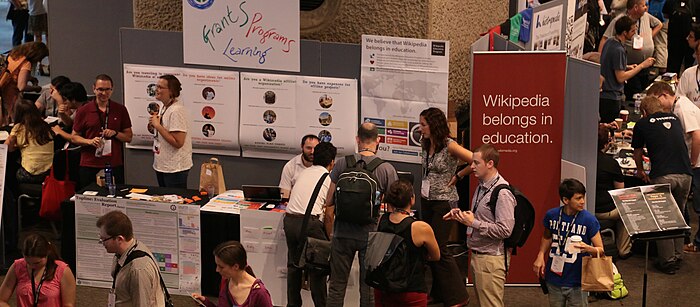
Those present at this year’s Wikimania may have witnessed a different presence on behalf of the Grantmaking team. The department, formed by Grants, Learning & Evaluation and Education teams, was present in the global conference that brings together Wikimedia project programs, movement leaders and volunteers to learn from and connect with one another at the five day event. Whether at our booth in the Community Village or in the many presentations and workshops, the conversations we shared with community members from all over the world were very enriching.
We heard from more and more people interested in gathering data and working toward understanding, at a deeper level, what works and why. In this way, we are all working together towards building sustainable growth for the movement’s projects and programs; work that not only will involve new editors, but partnerships with other institutions that can help create free knowledge.
The need for sustainable growth
Before the conference, we hosted a small Learning Day for leaders in our grants program to share experiences and insights, from applying evaluation to various projects – projects that might help the movement grow. Jake Orlowitz shared his game The Wikipedia Adventure, an experimental project aimed at onboarding new editors. Sandra Rientjes, the executive director from Wikimedia Nederlands (WMNL), presented her chapter’s long-term approach to programs. Wikimedia UK’s Daria Cybulska shared the Wikimedians in Residence Review to show how they have used evaluation to redesign and improve an existing program. To explore diversity, Amanda Menking talked about her experience in her research project on women and Wikipedia.
These four presentations demonstrated the wide range of experiments being conducted by the grants community. Continuing to measure and discuss evaluation can help us all discover projects that have impact and to understand if and how they can be replicated in different contexts.
The day came to a close with a lively Idea Lab Mixer and Learning Day Poster Session happy hour. This was an opportunity for grantees to showcase their work and insight gained in the past year and ignite conversations around creating new ideas to make Wikimedia even more awesome.
The need to learn from each other
For the first time, all the representatives from our grantmaking committees got together for training and impact discussions. The pre-conference sessions also hosted a special day to welcome new FDC members and discuss Participatory Grantmaking. Guest speaker Matthew Hart shared with the group his research on how this practice takes place and what benefits it has on donors, communities and movements. What does it mean to give a Wikimedia grant and work together in a project? Under the light of the recent Impact Reviews developed by Learning & Evaluation team, that focused on Annual Plan Grants and Projects and Event Grants, three main priorities were highlighted with regards on working towards the movement’s goals: expanding reach, generating more participation and improving quality.
The Wikimedia movement is known for its capacity to innovate and learn from peers. We are now at a point when we need to standardize learning processes and generate resources that guarantee this knowledge exchange. As we continue working on program resources, we will also start working more closely with grantees on their project evaluation plans, hopefully reducing the time invested in this task and increasing impact.
The need for better tools and resources!
Wikimania was a great place to share new tools, resources and strategies around shared programs. Some highlights include:
- Category Induced: Allows you to know how many categories were created from a collection category.
- Easy FDC report: a tool that lets you gather the number of uploaders, files uploaded and highlighted files from a specific category and make it format-ready for FDC reports.
- Unused files: Allows user to see which files on any given category have not yet been used.
- Wikimetrics new features: this tool now lets you know which users from your cohort are newly registered and also includes the new metric ‘Rolling active editor.’ Find out more on on this presentation!
- Quarry: Allows you to run SQL queries against Wikipedia and other databases from your browser. Stay tuned for more documentation on this tool on the Evaluation portal on Meta!
For tool-driven program leaders, the new tools directory will come in handy to find these and other resources to measure online impact!
As we continue to work on the challenges that surfaced during conversations at Wikimania, we hope to continue the dialogue online with program leaders and grantees all over the world. We are working to connect talented people and good ideas across the movement, so we call out to movement leaders: stay connected, reach out and ask!
María Cruz, Community Coordinator of Program Evaluation & Design

Can you help us translate this article?
In order for this article to reach as many people as possible we would like your help. Can you translate this article to get the message out?
Start translation

